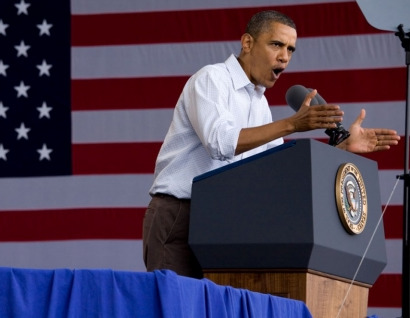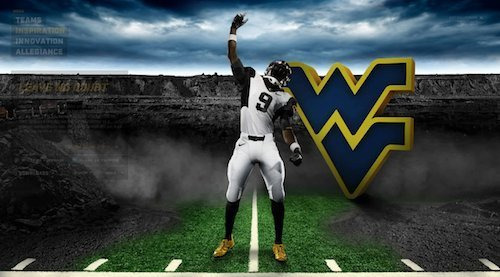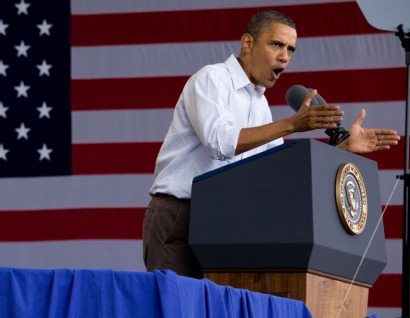 Obama speaking to a Labor Day crowd about job creation.Photo: The White HousePresident Obama told a Labor Day crowd about a new stimulus plan that would seem to be a sure winner: Let’s create jobs by rebuilding America’s highways and infrastructure and, while we’re at it, get serious about high-speed trains. What’s not to love?
Obama speaking to a Labor Day crowd about job creation.Photo: The White HousePresident Obama told a Labor Day crowd about a new stimulus plan that would seem to be a sure winner: Let’s create jobs by rebuilding America’s highways and infrastructure and, while we’re at it, get serious about high-speed trains. What’s not to love?
Well …
More bank for your buck: Expect Republican leaders and righty pundits to jump on Obama’s proposal for an “infrastructure bank.” The bank would be run by the federal government, but rely heavily on a panel of non-government experts to determine which projects get funded. Translation: money would, in theory at least, be doled out on merit, rather than by members of Congress steering it back into their districts. Sounds perfectly reasonable, but the plan offers a big fat target for those bent on fueling “big government” paranoia. Sheryl Gay Stolberg and Mary Williams Walsh have more in The New York Times.
There’s also the matter of where at least part of the $50 billion to rebuild the country would come from. Obama’s suggesting that some of it could be generated by slashing tax breaks for the oil and gas industry. Given that yesterday was a holiday, the howling from Big Oil hasn’t reached full volume yet, but a comment from an unnamed business lobbyist to Darren Goode of The Hill, offers a hint of what’s to come:
Right now we’ve got considerable consternation about the payfors. Way to take something that should be bipartisan and make it partisan.
Mistakes … they’ve made a few: Summer’s over, but David Hammer of the New Orleans Times-Picayune provides a sobering coda to the grim Gulf story that’s dominated the past four months. He lays out BP’s tragedy of errors; a string of five misjudgments or bad decisions that culminated in 4.1 million barrels of oil in the Gulf. Hammer’s analysis is a reminder that for all the technological advances and supposed safety procedures that are now a part of deepwater drilling, it’s still a high-risk business dependent on decisions by people who are under the gun to keep costs under control. His story points out that at the time it exploded, the so-called “well from hell” was running $40 million over budget:
Despite the well’s orneriness, the engineers repeatedly chose to take quicker, cheaper, and ultimately more dangerous actions, compared with available options. Even when they acknowledged limited risks, they seemed to consider each danger in a vacuum, never thinking the combination of bad choices would add up to a total well blowout.
Crude awakening: Another reminder that the clock is ticking louder for fossil fuels: In a private report prepared for its country’s military, a German think tank concludes that we could reach “peak oil” this year. That’s the point at which production of oil worldwide tops out, and then begins declining. This conclusion is even more pessimistic than the analysis presented by the U.S. military last spring. That report predicted that “by 2012, surplus oil production capacity could entirely disappear.” Either way, oil-exporting countries like Saudi Arabia and Iran are expected to gain even more economic and political leverage, and the competition for dwindling supplies of oil will get nasty, particularly with China and India going crazy for cars. Stefan Schultz writes about the German think tank analysis in Spiegel Online:
It (the report) warns of shifts in the global balance of power, of the formation of new relationships based on interdependency, of a decline in importance of the western industrial nations, of the “total collapse of the markets” and of serious political and economic crises.
Double trouble: And on cue, the Chinese government says the number of cars there will double to 200 million by 2020. Last year, China became the top car market in the world — topping the U.S. — with almost 14 million sales. This year, that number’s expected to climb to 15 million.
A splash of cold water: All of the above, of course, will fuel rants about the U.S. need for energy independence, and about how the only way to get there is offshore drilling. Shell, for instance, is anxious to start drilling exploratory wells off the coast of the Alaska next summer. So far, Interior Chief Ken Salazar is saying all the right things. During a quick trip to Alaska last week, he noted that offshore drilling in the Arctic presents a different breed of potential hazards than in the Gulf, which is why he needs a lot more reassurances that oil companies can handle a spill in the harsh conditions and remote locations there. Of course, officials for Shell, at a hearing in Anchorage last month, insisted that because of the shallower water and colder temperatures, it would actually be easier to clean up a spill in the Arctic than in the Gulf.
Dead alert: We’ve been hearing about the dead zone in the Gulf all summer. That’s the end result of the wicked cycle known as hypoxia where nutrients from fertilizer run-off spill into coastal waters. The nutrient boom sparks an algae explosion which sucks so much oxygen out of the water that marine life can’t survive. Turns out that, according to a new study by NOAA, the number of dead zones along U.S. coastlines has jumped by 30 times since the 1960s. In fact, researchers say they found dead zones in half of the 647 waterways they studied. One zone off the coast of Oregon and Washington — apparently exacerbated by climate change — is now the third largest in the world.
 The controversial Nike ad.Just do it … over: So what does Nike know about coal mining? Apparently, not much. As part of a promotional ad for a special uniform that it designed for the West Virginia Mountaineers football team, Nike featured an image of a player in front of a flat, treeless mountaintop. The uniform looks suspiciously like a poster for mountaintop mining, the odious technique where coal companies blow the tops off mountains. The uniform is meant to pay tribute to the 29 miners killed in an explosion at the Upper Big Branch mine earlier this year. Unfortunately, they died in an underground mine. Nike says it will try, try again.
The controversial Nike ad.Just do it … over: So what does Nike know about coal mining? Apparently, not much. As part of a promotional ad for a special uniform that it designed for the West Virginia Mountaineers football team, Nike featured an image of a player in front of a flat, treeless mountaintop. The uniform looks suspiciously like a poster for mountaintop mining, the odious technique where coal companies blow the tops off mountains. The uniform is meant to pay tribute to the 29 miners killed in an explosion at the Upper Big Branch mine earlier this year. Unfortunately, they died in an underground mine. Nike says it will try, try again.
Seeing Reds
: You probably haven’t heard of Devin Nunes, a Republican congressman representing central California. But if you’re even a little bit green, he doesn’t like you. In a new book Restoring the Republic, he describes environmental lobbyists as “followers of neo-Marxist, socialist, Maoist or Communist ideals.” And that Pacific Gas & Electric, Ford, and Dow Chemical companies are “allied with extremist groups.” Oh, and also, that anxiety about global warming is “hysteria” spread by a “Doomsday cult.”
It’s a Mao world after all.



